|
|
Post by steelmonkey on Nov 23, 2017 23:43:30 GMT
Trusting you, Jim, to keep Facebook refusniks like myself updated on the when and where and how of buying this music when it is available !
|
|
|
|
Post by JTull 007 on Nov 24, 2017 0:22:23 GMT
Trusting you, Jim, to keep Facebook refusniks like myself updated on the when and where and how of buying this music when it is available !  As Soon As Dee Palmer says so! As Soon As Dee Palmer says so!  |
|
|
|
Post by rredmond on Nov 25, 2017 4:01:28 GMT
Please yes! Let us know. Happy Tull Dance: 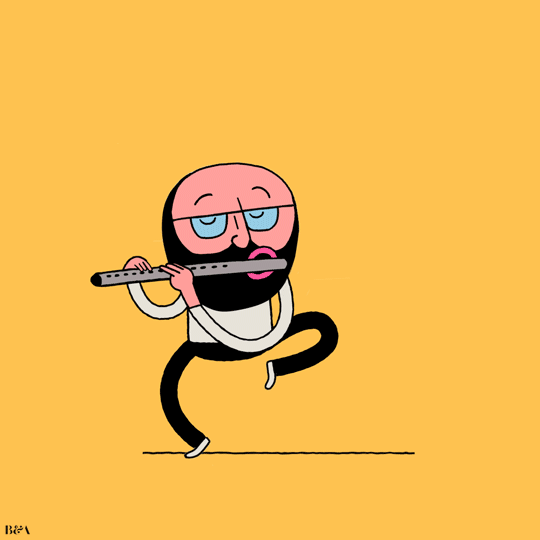 |
|
|
|
Post by JTull 007 on Nov 26, 2017 22:56:14 GMT
Glorious Devon  LINK 1 LINK 1  It was with a noticeable lightness of foot and an accountable feeling of inner warmth and It was with a noticeable lightness of foot and an accountable feeling of inner warmth and
expectation when, in the early morning of Valentine’s Day of this year (14th February 2017)
I set out from my home in Shropshire, UK, to drive (on a bearing SSW and over a distance of some 200 miles)
to South Devon to meet, and for the first time in many years,
to work once again with my cherished friend of nigh on fifty years, Martin Barre.
I first met Martin on May 13th, 1969 at the Guildhall, Portsmouth where Jethro Tull,
supported by 10 Years After were on tour.
I had begun working with the group in August 1968 on “This Was” and was keen to meet Martin
and hear him play live; I was most impressed with his playing and have remained so since.
On that tour, Tull and the “other” Chrysalis group “10 Years After” were taking it in turns to open the show.
Alvin Lee (guitarist with 10 Years After) - with his nose out of joint and distinctly moody because
10 Years After had opened that night and not done very well - pushed the PA speakers over as he left the stage.
On the drive back to London I remonstrated with Chris Wright
(manager of 10 years After) over Alvin’s “spoilt child” behaviour.
“You can say what you like, DP, said Chris, but he can sell-out Filmore East any night of the week.
As far as I’m concerned, he can do what he likes.” (Shut up, Palmer, I thought. Welcome to rock and roll!)
Martin, however, is a far cry from the image of the “prima donna guitar hero” and is a paragon of modesty,
gifted with a very dry sense of humour (often self deprecatory).
I recall the TOTRNR tour when we were taken, mid-tour, to a theatrical costumiers in Amsterdam
in an attempt to change our on stage image. Martin chose a very stylish, floral, two piece suit.
When we came off stage next night I said to Martin, enviously: “I’d die for that suit”.
He replied drily “I died in it - tonight”!
On a day off in Los Angeles during the 1978 tour - Martin, Julie, Maggie and I went on
the Universal Studios tour and after a morning viewing the sets, etc, we decided to get
something to eat. “There’s a McDonalds here, said Julie. I wonder where it is?”
Just at that moment a seriously overweight woman in a shell-suit waddled past.
"Follow her" said Martin!
During the 70’s, Martin owned a property in the county of Herefordshire - a county adjacent
to the West Midlands - but he soon chose to live in Devon and has remained there ever since.
In my case, I lived for many years in Surrey and Sussex but, three years ago I moved to
Shropshire - another county adjacent to the West Midlands - fulfilling a life long wish to return
to “The Marches” i.e.the land dividing England and Wales and the home of my forbears.
My children used to love going to Martin’s house. He gave terrific parties and we shared many
enjoyable times at his homes in Berkshire and in Devon.
On one memorable occasion there were about 30 of us (including some of the road crew)
staying at Martin’s home for the weekend. Someone suggested we all go horseback riding
the next morning. Risky, I thought, and maybe a tad ambitious.
(Most of the road crew had never been near a horse before! )
Talk about the Charge of The Light Brigade or Foinavon’s Grand National? What!
Neither could compare with the havoc brought to the leafy lanes of south Devon that next morning.
Oh, did we laugh!!
After arriving at Martin’s home (following a four hour car journey) the conversation turned,
quite predictably, from the usual, welcoming pleasantries to “Do you remember when”....etc.
The fact that we hadn’t seen each other for quite some time invoked so many memories;
the good and the not so good.
We sat, talked and laughed so much - Julie Barre as well - re-living our memories of life on the road
and at home with Jethro Tull, whilst sitting in their welcoming kitchen.
Among much reminiscing, we recalled a late 70‘s tour and the opening of the show.
(We used to open the show either “loud” or “quiet”, and, during one particular tour,
we were opening with “Thick as a Brick” i.e. quietly.)
One night Ian was strumming and singing away, and, as every Jethro Tull fan knows, the quiet,
introductory lines to TAAB are punctuated, suddenly, by the rest of us playing a mighty “F chord”
after Ian sings ...”your deafness, a Shout!”
Well! John G must have been tripping because, just after Ian had sung his first line i.e.
“really don’t mind if you sit this one out,” John pulled off the loudest “F natural” on his Bass Gtr
that I’d ever heard in my life! ...but it was a whole phrase TOO SOON!
The note reverberated round the 20,000 seat arena like a salvo
from the whole of HM’s navy prior to the D day landings!
I thought none of us would be able to play another note that night; we were all crippled
with laughter: particularly Martin! John, in his inimitable way, just laughed it off.
(There must be a book (at least) to be written giving account of those halcyon days as members of the group.
Moreover, its all just “fun” stuff, too!)
So, later on that morning and on entering Martin’s studio, almost as soon as we started to
work on my songs, the old magic was back: just like it was all those years ago in Tull, with Martin
producing great licks out of thin air, not unlike a magician pulling rabbits out of a hat!
The results of that day are all captured here on “Through Darkened Glass.”
Take time out to savour his exemplary playing, particularly in “Emmanuelle”.
His first solo entry and extemporised licks are right up there
with those of the guitar greats, Joe Pass and Barney Kessel.
It’s the same with his solos in Urban Apocalypse and Through Darkened Glass.
Unmistakable in style and totally riveting in content.
Listen to Martin's solo on Urban Apocalypse  LINK 2 LINK 2 
I could have gone on for days, and, for sure, I had the best time I’d had in any studio for many a year!
Thanks Martin. Top Man; Top Friend. I owe you big. dp 2017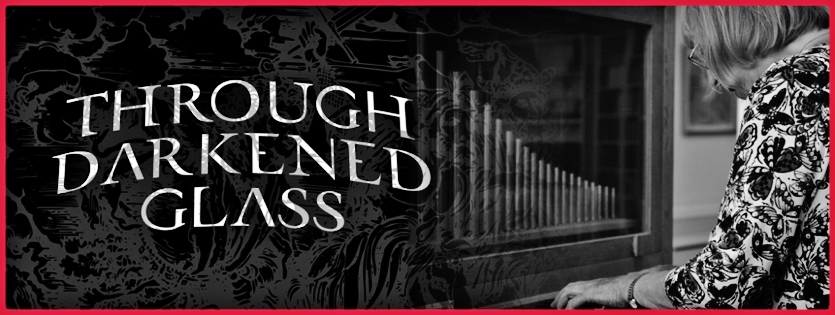
|
|
|
|
Post by rredmond on Nov 26, 2017 23:29:56 GMT
Yay! Sounds awesome!
What’s the line up? Is Martin playing flute too?
Great stuff thanks!
|
|
|
|
Post by JTull 007 on Nov 28, 2017 4:05:25 GMT
From Dee Palmer...
I'm delighted to learn that Prince Harry, a senior member of my regiment (The Blues and Royals)
has announced, formally, his engagement and forthcoming marriage to Ms Meghan Markle.
I wish for them a life of love and happiness (which is not so easy to come by in this, largely, unsettled world).
Keep marriage alive, say I. I shall write a wedding anthem and send it to them!
(A song I wrote and dedicated to his mother, Diana, Princess of Wales}
is featured on my new album, Through Darkened Glass.
|
|
|
|
Post by steelmonkey on Nov 28, 2017 17:36:56 GMT
I am REALLY looking forward to getting my ears on Dee's music.
|
|
|
|
Post by JTull 007 on Dec 14, 2017 1:25:40 GMT
Old Lady Grey  LINK 1 LINK 1  It’s not at all necessary to possess a deep-rooted knowledge of the world of the arts It’s not at all necessary to possess a deep-rooted knowledge of the world of the arts
to be made aware of the fact that many of the revered and less well known global examples
of literature, visual and graphic art (and not to forget the natural landscape) have provided
the inspiration leading to the creation of many fine works, and this is reflected, particularly,
in the world of music. “Fingal’s Cave” (A Hebridian Overture) by Mendelssohn, “La Mer” by Debussy,
Vivaldi’s “Four Seasons” and, of course, Beethoven’s 6th Symphony, The Pastoral, all spring readily to mind.
Architecture, however, seems not to have featured that often as an inspirational cause.
“The Great Gate of Kiev”, however, is a notable exception, providing the inspiration for the
monumental climax in Mussorgsky’s celebrated composition “Pictures at an Exhibition” and it
is in this exalted company where, humbly sits, my simple strophic song, “Old Lady Grey.”
I hope that you may find this account of its creation to hold a little interest and, should the CD
come into your hands, you might possibly spot the phrase I borrowed from
Debussy's “La Cathédrale Engloutie” - the sunken cathedral.
Whilst driving through France (en-route to Monte Carlo for the recording of my orchestral contributions
to the Jethro Tull album, “Minstrel in the Gallery”) we, i.e. my family and I, had deviated slightly from
the motorway to visit Chartres and to see the celebrated Cathedral that has stood there since
the very beginning of the 13th century.
It was a Friday in early June and, from the top of a hill some miles from Chartres, I first saw
the magnificent spires of the Cathedral, piercing the lingering mist of that summer morning.
From that distance, it seemed (for all the world) that the cathedral was sitting regally astride
acres and acres of golden corn, bowing gently in deference towards her.
It was a totally unforgettable experience.
On entering the cathedral, I dutifully gave instructions to my family what to do and where to
go if anyone became separated. We then made our way into the coolness of the mighty,
impressive building which, even in the early morning, was already teeming with visitors of
all races and creeds. I was immediately drawn to admiring and studying the intrinsically
detailed tracery, the awesome vaulted roof and the perfectly cut joints in the stone columns.
(My hobby at the time and for many years after was bricklaying and masonry and I recall
wishing (quite selfishly) that I’d been on my own with all day to spend, feasting my eyes
on this impossibly beautiful building, designed and erected to the glory of God and brought up
and out of the ground all those centuries ago by an army of mediaeval masons and labourers.
I gradually made my way to the transept and it was while I was there, studying the tracery and the detail
of the stained glass of the “South Rose Window” and standing in the shafts of sunlight, that it happened.
“It” was (and still is) one of the most awe inspiring experiences of my life.
Concentrated in absorbing so much of the detail of the window I felt utterly and completely alone.
Suddenly and unaccountably cold, I seemed to have moved into a parallel universe within that
ancient place, but no longer assaulted by the continuous “Clicking” of cameras and the irritating,
garrulous exhortations of the tourists, but enshrouded, now, by an eerie silence.
Then, new distant sounds fell about my ears. They seemed to come from high, high above me; from
the uttermost heights of the vaulted roof. Cries of anguish and despair - the invocations of people in distress.
Then I saw them; the ghosts of the men and women who’d given their lives (and for some, their life)
for the building of the cathedral. They were perched like frightened sparrows in the furthest corners of
the vaulted roof - and then, in an instant, they were gone: disappeared, and, with them, their muted cries.
Who could I tell of this? Who would believe me? .......and then, breaking this strange silence,
there returned the harsh counterpoint of camera shutters and the incessant whisperings
in strange, unrecognisable vowels.
Though it had seemed much longer, I had been in that place for but a short time and was brought
quickly back to my senses with the urgent realisation that it was me - not one of my young children
- who’d managed to lose myself, and that my family were probably anxiously searching for me.
I soon found them - together, safe and gathered in the place I’d designated and, smilingly, took
in good heart their gentle mocking of me. We made our way out of the cathedral and to our vehicle,
Maggie taking the children to buy cold drinks.
Still stunned by my recent, incomparable, and almost life-changing experience,
I sat in the car, took out my lyric book and wrote: Old Lady Grey
I came to see you yesterday, my dear.
I walked into your womb and touched upon your soul
on Friday - sad day.
I saw you in your morning majesty.
A poppy midst the acres of the rye.
Don’t try to fool me with your dreadful piety:
Kyrie Eleison.
The melodies came into my mind as I wrote each phrase of the lyric.
(Some months later, back in England, I completed the song.)
DP Shropshire December 6th 2017
Listen to an Audio Excerpt of Old Lady Grey  LINK 2 LINK 2  
|
|
|
|
Post by steelmonkey on Dec 14, 2017 17:31:06 GMT
Wow. I 100% believe that Dee saw the souls of the workers sacrificed eternally to produce an eternal building. We are lucky Dee has the heart and soul herself to commemorate them and the courage to reveal what she saw.
|
|
|
|
Post by JTull 007 on Dec 25, 2017 19:12:42 GMT
Night In Spain  LINK 1 LINK 1  Mindful of the fact that I have claimed my upcoming album Through Darkened Glass Mindful of the fact that I have claimed my upcoming album Through Darkened Glass
to be a collection of songs reflecting upon a handful of a lifetime’s varied experiences,
one can be excused, quite readily, for thinking: “Night in Spain? What’s that all about then, Ms Palmer?"
Well, the idea for the song came to me following a simple gesture made
by a couple of female fans at Los Angeles Airport in January, 1975.
Earlier in January, I had flown to LA for a few days to work with Ian Anderson on the songs to
feature on the next Jethro Tull album, “Minstrel in The Gallery”
and was sharing a rented house with him, up in the canyons.
(Incidentally, the last tenant of the house had been Marty Feldman, and he’d left lots of empty,
small cigar tins lying around. I’ve often wondered since if there was a connection between
that and one of Ian’s later songs... I must ask him sometime.)
On several evenings during my stay, Ian was invited to appear as guest DJ on a late night,
local LA radio station. I usually took myself off to Barney’s Beanery, down in West Hollywood,
for delicious burgers and lots of fun!

On the day we departed LA, Ian and I arrived at the airport and the two girls just came up to us
and handed a rose to each of us. Simple as that and, though not necessarily a regular event
in my life, I accepted my rose, as Ian did his.
(We were on our way to North Carolina, for Ian to pick up on the second half of the Warchild Tour
and for me to spend a few more days working on the songs while the band rehearsed; on the plane,
Ian gave his rose into my keeping).
When we checked into the Smokey Mountains Hilton in Asheville, NC - I remember it well! -
I asked the desk clerk for a vase to be delivered to my room. The vase arrived and I placed
the two roses in it (having first cut back an inch or so of the stems.)
Next morning I was saddened to see that both roses were dead!
A cue for song if ever there was, so I got out my lyric book and wrote:
Night In Spain
The flowers you gave, they died next day.
The words you spoke won’t rhyme the way
you made them sound when we first met:
When was it now?
It was quite some time before I got round to finishing the song and, when I did,
I chose to embrace that much revered advice of Charles Dickens; namely,
write what you know and make up the rest! 
And so the narrative of this cautionary tale deals with those issues which some young
(and not so young) holiday-makers, having departed to various holiday destinations in Spain,
may have to face (a week or so later at Luton Airport or some other godforsaken place
following their return at 2.00 a.m, alone and on some cold, grey, English morning) after
having travelled - in one week - to the Moon or Mars (and back) with someone they are
unlikely ever to see or hear from again - or not - as the case may be.
The trick of this tale is in the last two words.
I invite you to buy the album to find out the sting in the tail and enjoy!  DP Shropshire December 23rd, 2017 DP Shropshire December 23rd, 2017 
Listen to an Audio Excerpt of Night In Spain from Dee's Album! LINK 2
|
|
|
|
Post by steelmonkey on Dec 25, 2017 20:23:23 GMT
I will buy the album the millisecond it is available !
|
|
|
|
Post by JTull 007 on Dec 26, 2017 11:35:21 GMT
Image by Scutty Lee February 17th, 2017
A wonderful day in the studio this week with Martin Barre & Dee Palmer,
who worked together in Jethro Tull for many years back in the 60's and 70's.
So nice to see and hear them making music together again,
and to be producing - it's a real honour to have the chance to work with
such musical legends. — feeling privileged with Scutty Lee.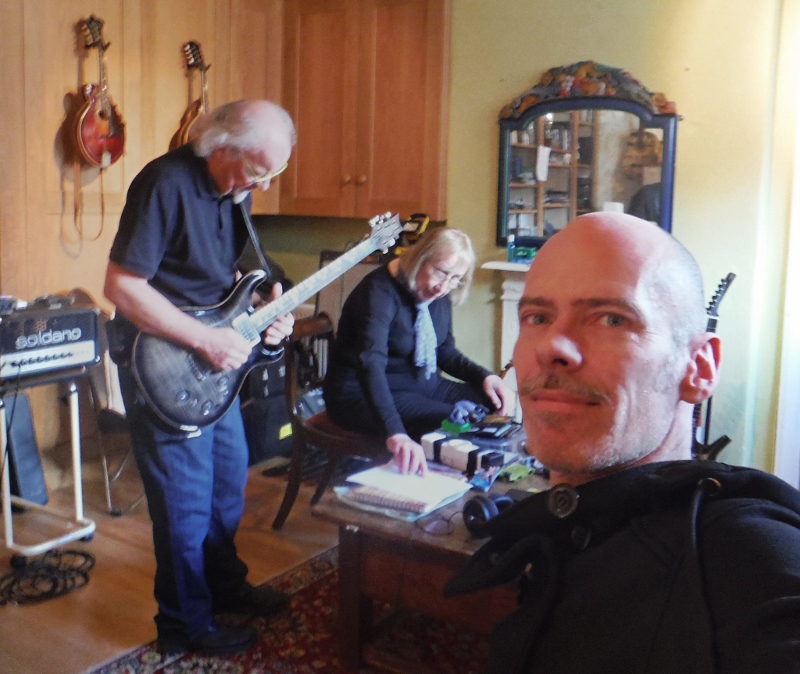
|
|
|
|
Post by JTull 007 on Jan 2, 2018 2:04:12 GMT
Emmanuelle - The story behind the song  LINK 1 LINK 1  As is the case with all the songs comprising Through Darkened Glass - my soon to be released album As is the case with all the songs comprising Through Darkened Glass - my soon to be released album
of original songs - the French chanson-style Emmanuelle is no exception to the fact that its existence
is owed, wholly, to yet another of my life’s experiences and, whilst I don’t claim to have had more than
my share of them, quite a few seem to have left a deep and lasting impression.
The inspiration for the song lies within the iconic, black and white photograph taken by the acclaimed,
French photographic artist, Robert Doisneau. Its subject is two young people caught in a close embrace
on a crowded pavement, opposite the town hall in Paris during the nineteen-fifties.
The title of the photograph is Le baiser de L’hotel de Ville, Paris. (The kiss by the Town hall, Paris.)
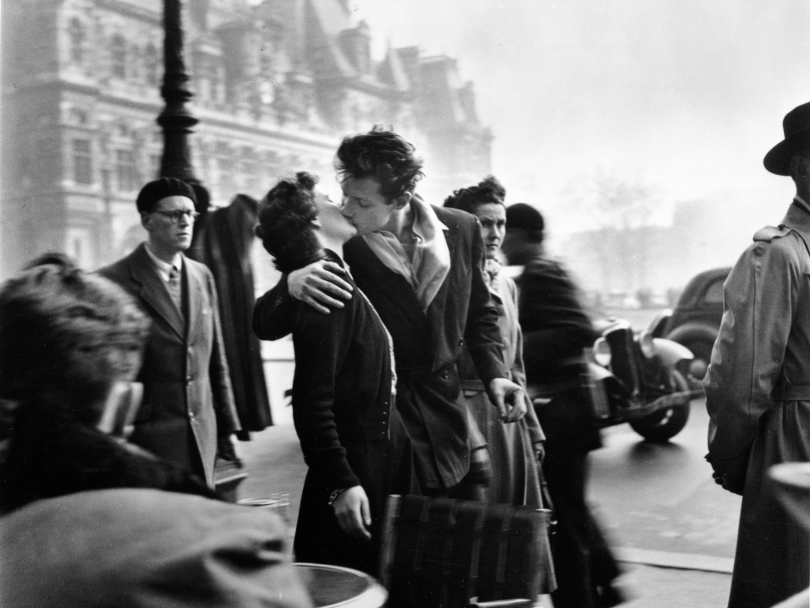
I first became aware of the image during the mid to late nineteen-sixties when I was a student at
The Royal Academy of Music in London. It became very popular. Though not having quite the cult “must have”
following as did the poster images of, say, Che Guavera, Guernica, the Spanish Lady and a handful of other
“bedroom wall icons”, Le Baiser had its own, special appeal - and particularly, though not exclusively, to teenage females.
However, it was not until much later - the mid nineteen-nineties (when I was attending a commissioning
meeting in the Montreal office of the president of one of the major record companies) when I
encountered the subject again. Actually, I couldn’t miss it!
On this occasion an extremely large print of it was hanging on the wall behind the president’s desk
and measured at least five feet by three feet - maybe more! (You can work out the metric equivalent.)
Later on that afternoon, during the cab ride to the airport and musing over the events of my visit -
the concerts I’d performed and the terms of the contract I’d been offered - I couldn’t get the pervading
image of that haunting and demonstrably simple gesture of love and affection out of my mind.
It was as though I had seen the photograph for the first time that afternoon.
The people in the photograph - particularly the young woman - began to occupy all of my thinking.
Who were they - that man and woman, joined in a deceptively simple and arrestingly innocent embrace?
What, I wondered, became of her afterwards? Were they an item or did she go home alone?
(In the song I opted for the latter.) Was she happy ever after?........who knows?.......maybe not.........
(I wasn’t - that's for sure. Maggie had died only earlier that year.)
Later that evening, after settling down on the night flight to London but energised by a welcome,
though unexpected visit from my muse, I took out my notebook. However, before I could begin to write,
I needed to choose a name for the girl in the photograph, about which I was now utterly obsessed.
To me, she was the key and would be the subject of the chorus.
Emmanuelle came to mind. I thought it suited her. Alors! Emmanuelle elle sera. Emanuelle
She climbs the stairs to a dark apartment
turns on the light - there’s no one there.
Puts on some sounds to fill the air:
“Motets of penitence and prayer”.
Walks down the hall, checks her machine;
the light stays still and green - it’s a mean machine.
Picks up the phone but won’t call yet;
reaches for her cigarettes.
Starts to dial but stops mid call
Puts down the phone - sits in the hall.
Chorus:
Emmanuelle, that’s life - that’s all there is to it;
Emmanuelle, it’s the same for everyone.
Life’s not so much a game of cards, Emmanuelle,
as how to play a bad hand well. etc. .....et ca va.... (and so it goes....)
Before I arrived in London next morning the words and music were written. Finished. Complet!
(Mind you, I think someone else had been pushing my pen!)
(The French version was completed some time later - just in case I landed a gig in Paris!) Taken in 1978, Martin Barre and I are the bookends of this photograph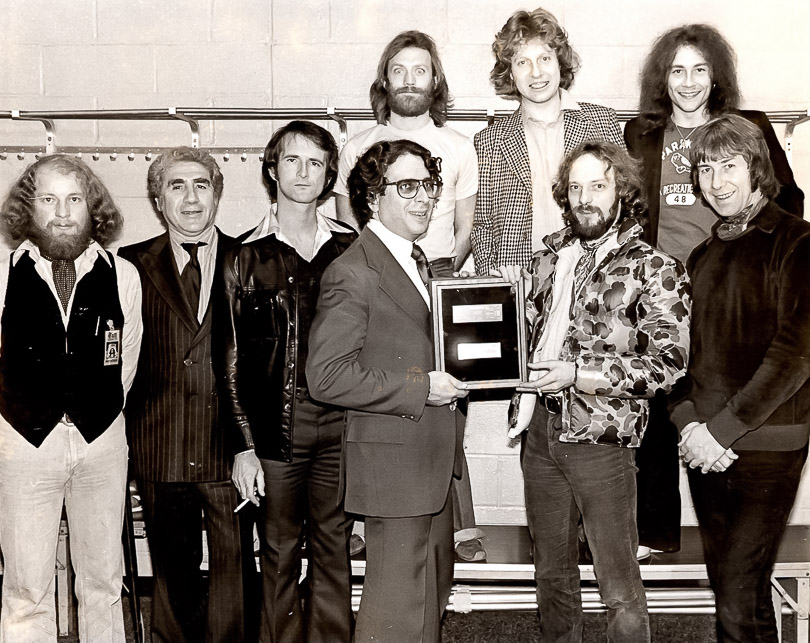 The recording features the guitar of guest soloist, Martin Barre - band mate from our years together The recording features the guitar of guest soloist, Martin Barre - band mate from our years together
in Jethro Tull and a life long friend. From his poignant, bluesy, entry at the end of the first chorus,
Martin’s guitar solo and searingly passionate fills in the last chorus add a very special character and
mood to the track. Great stuff!
To me, the song epitomises France and everything French. It reeks of it!
(Not the garlic and the cooking but that special.....“je ne sais quoi!”)
So, when you hear those first, unmistakably haunting tones of the musette accordion - that stalwart
of french cafe music - just close your eyes and allow yourself to be transported back in time.......
Revisit those heady summer evenings and those dreamy, candle lit cafes a rive gauche ....
those halcyon, Salad Days of youth..... and love.... and broken hearts........ Enjoy.  DP Shropshire December 31st, 2017 DP Shropshire December 31st, 2017
Listen to an Audio Excerpt of Emanuelle from Dee's Album  LINK 2 LINK 2 
|
|
|
|
Post by steelmonkey on Jan 6, 2018 18:17:55 GMT
Wow. The interview with Dee Palmer in current AND is juicy. Can't wait for her new CD and more insights, be they via interviews or book, about Ian and Tull. She is NOT tiptoeing at all...and for that must be admired.
|
|
|
|
Post by JTull 007 on Jan 7, 2018 17:17:46 GMT
Black Orpheans - the story behind the song  LINK 1 LINK 1  Within the thread of personal experiences reflected in the songs comprising Through Darkened Glass, Within the thread of personal experiences reflected in the songs comprising Through Darkened Glass,
the words and music of Black Orpheans feature not so much as a commentary upon one single event but,
much more so, as a detailed account of the environment within which, as a child,
I was raised or better, exposed to, and totally immersed therein.
Namely, the relentless and unforgiving routine of toil, noise, the constant threat of serious accident and
attendant loss of life or limb which our fathers (and their forbears before them) endured for the reward
of pitifully meagre wages, whilst living and raising families in basic colliery accommodation - and all of it
under the pervasive, acrid and omni-present cloud of fine, black dust which emanated, day in day out,
from the commodity which the whole nation depended on to keep the wheels of industry turning: coal.
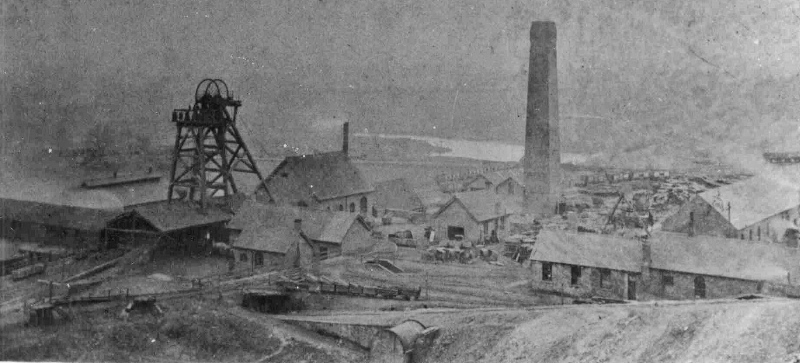
Several of my relatives worked at Holly Bank Colliery
By the mid 1800’s my paternal great-grandfather, my grandfather (and his brothers) had moved from
rural Shropshire and employment as farm labourers to the industrial heart of the Black Country
to take up employment as coal miners.
They also worked at the adjacent Brick and Tile works.
When a new pit was dug, often large deposits of Marl and Brick Earth were discovered. As a consequence,
the landowner would profit not only from the coal extraction but from the manufacture of Bricks and Tiles.
Some of them were to perish in the 1914-18 war,
but those who survived returned to the collieries and resumed their work underground.
Membership of the brass bands and choirs (which were financed and instituted by the Victorian pit owners) was
offered to them as recreational pursuits - though I suspect the true motive was as an alternative to the demon drink!
(Needless to say, quite a few of my family managed to cope with all three of those recreational pursuits -
at least four pints of mild ale a day was de rigueur!) 
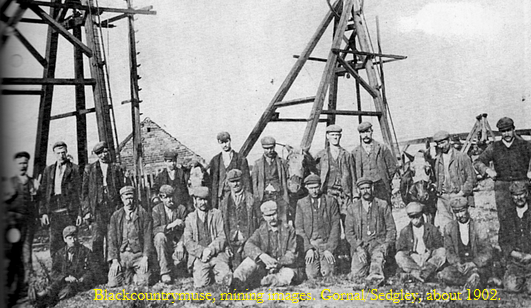
I remember, as a child, seeing miners dressed in a similar way.
They became staunchly enthusiastic members of the Orpheus Choirs and brass bands affiliated
to their local collieries and this song is dedicated to their memory.
Ever mindful of my childhood memories of their concert performances,
I have (in the slow, second half of this piece) managed to include musical and lyrical references to the songs
I will forever associate with them:
Shenandoah, The Skye Boat Song, Oh Danny Boy, Linden Lea, All of an April Evening, Jerusalem and,
perhaps the most revered offering in their repertoire, Crimond - and all within an eight bar phrase.
Mind you, I’ve never been in any doubt as to whom I owe thanks for the privilege of whatever musical gift
I have - though at times, employing it has been a bit like digging the very coal itself!
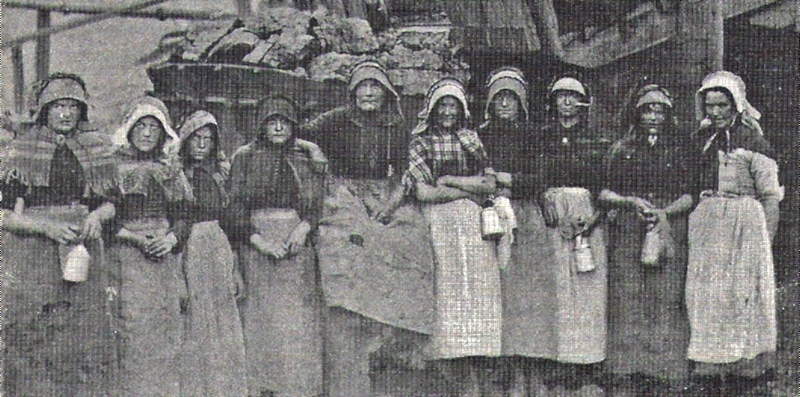
Way to go, Wench Palmer!
Wenche (which is a Middle English word) means servant or maid and NOT whore or prostitute - far from it.
All the girls at my junior school or in our neighbourhood were called Wenches.
The Wenches pictured here worked above ground, sorting stone and debris from the coal.
Mind you, I’ve never been in any doubt as to whom I owe thanks for the privilege of whatever musical gift
I have - though at times, employing it has been a bit like digging the very coal itself!
In summation of “Black Orpheans”, it is from the very opening pit-head soundscape and the cries of
“Rappety Bang” - an imitation of the rapid ringing of three bells and the doors of the cage closing
(before it descended underground) - that both the words and the music of this paean to my ancestors,
combine to paint, unashamedly, the stark contours of their simple, daily lives.
The final section of the song
(where the close harmony *bouche fermée of the ghostly, disembodied subterranean male voice choir takes
precedence) underscores the passing of, not only an epoch, but of close knit community life as once it was.
It was no small event when the Health and Safety Act of 1974 was passed onto the Statute Book, expressly to forbid employers from continuing to make rigorous, physical demands of brave men, whom, for ages, had been
engaged in the most extreme and dangerous occupation that, once, had been the very life blood of Great Britain.
To the passing of the great Education and Welfare acts of the 1940‘s
(coupled with the endeavours of my forbears) I owe my fortunate escape from a similar existence to theirs.
RIP Black Orpheans
.........The songs they sing?
They’ve known them since their childhood.
They heard them first at their fathers’ knee.
Songs like “Shenandoah” and “The Skye Boat Song”;
“O Danny Boy” and “Linden Lea”.
But when they sing
of lambs of an April evening;
“Jerusalem” and “Crimond’s” dying fall,
they bare their souls
for a thousand fathers,
and cry their songs
to an empty hall.
DP Shropshire 5th January 2018 * Humming  LINK 2 LINK 2  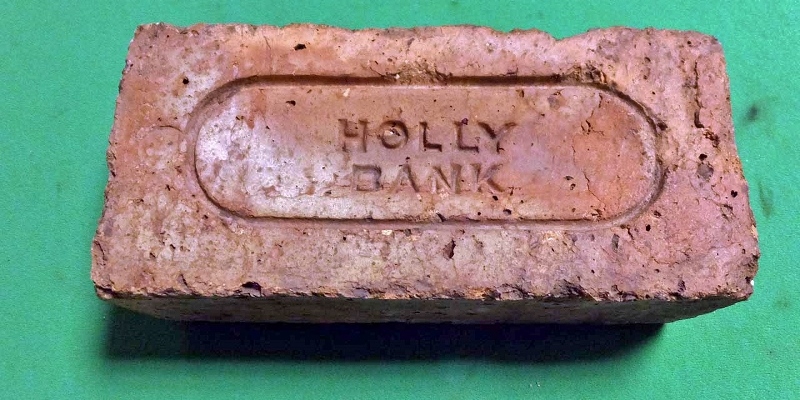
|
|
|
|
Post by JTull 007 on Jan 23, 2018 2:50:14 GMT
Title Track Through A Piece Of Darkened Glass The writing and performing of Popular Songs for one’s own enjoyment or in pursuit of a career
as a singer/songwriter is an activity that can be enjoyed (whilst others may suffer!) by people
without any musical training whatsoever. Some of the most original and successful artistes in
the genre have never received a music lesson in their lives!
The history and development of the form and its changing styles is well documented and
makes for really interesting reading. The source is traceable back to the French troubadours of
the 11th century, but it is since the “popular music explosion” that followed the Second World War,
that the dissemination of the art has become a global phenomenon. It has produced an unending
stream of contrasting musical styles with performers generating fame and considerable fortunes
for themselves and, of course, for their publishers too!
Whatever choice of music we favour and prefer to listen to - be it live or on record -
is simply a matter of choice; the options are many and so widely diverse.
In my case - having, as a music student in the 60’s, discovered and become embroiled in the great
American Song Book - I was excited by the writing and performances of the emergent, fresh new
breed of both American and British performers who, clearly, were not frightened of their best ideas.
I came to admire greatly the singer songwriters of the early 60‘s i.e. The Beatles, Bob Dylan,
Jim Webb, etc. but, having spent most of my career as an arranger and orchestrator working
on other people’s music, the likelihood of me ever joining them in their craft - rather than
embroidering or adding another dimension to it - always seemed to be that one step too far.
I see now that, in retrospect, my problem was merely one of just starting and then getting on with it
- but I had first to cross that dreaded Rubicon of self belief.
However, back in the day when, at the beginning of my professional career, I was asked to work
(one after the other) with Roy Orbison, Bert Jansch, Gerry Rafferty and Ian Anderson.
Four, highly gifted singer/songwriters if ever there were. It was through working on their songs
(and the varied experiences I shared with them) that allowed me an insight into the esoteric,
select and rarefied atmosphere in which they functioned.
During that period a seed was planted which, of late, has at last flowered and today is embodied
in the content of this collection of original songs.
Of the four writers mentioned above, the one I came to work with most closely was, of course, Ian Anderson.
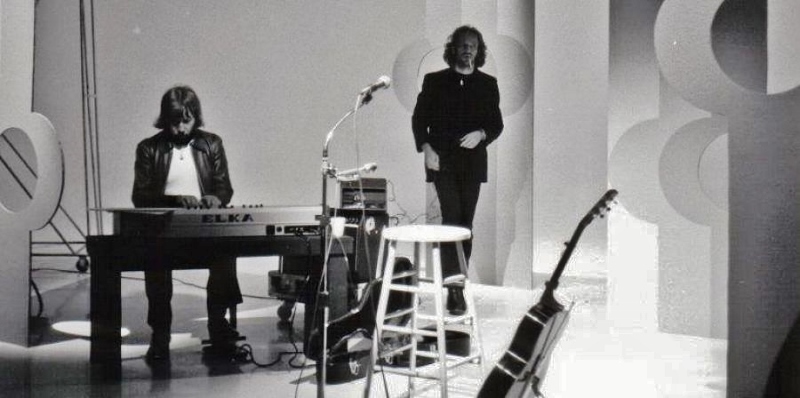 The Merv Griffin Show, Philadelphia 1977I’ve admired Ian’s work since we first met in 1968 (when I wrote the brass and reeds score for Move on Alone) The Merv Griffin Show, Philadelphia 1977I’ve admired Ian’s work since we first met in 1968 (when I wrote the brass and reeds score for Move on Alone)
- a track featured on This Was, Jethro Tull’s debut album.
My admiration (together with a deep and growing respect for his creative gifts and prodigious output)
grew over the years in which I worked on his songs.
Similarly, I was to become aware of his respect for my part and input in the scheme of things, and recall
(whilst we were recording the music for the aborted film project War Child) his astonishment and
immediate outburst of praise when, standing near to the rostrum in the studio, he heard for the first
time my treatment of the War Child Theme for Symphony Orchestra.
His remarks to me in that moment were clearly heartfelt and his response was endorsed most
generously by awarding to me 50% of the writing credit of that piece: as valuable too, was his
recommendation that I should spend more time writing original words and music. Say no more!
All of that seems (and is) a long time ago now, and over the twelve or so years I worked with him,
there are far too many favourites to enumerate, but A Christmas Song, Reasons for Waiting,
all of Minstrel in the Gallery, the purple period of Songs from the Wood and Heavy Horses, Moths etc.
(I could go on!) are right up there at the top. You’ll find that there is more than an occasional
(and not so blurred, either) fingerprint of the Jethro Tull style on several of the songs in this, my debut album!
Through A Piece Of Darkened Glass (the title song of the album) is nothing more (or less) than a
surrealistic allegory and not at all unlike a dream sequence, bordering on a nightmare: a riddle for
the listener to resolve within the ambit of their critical thinking.
It is dedicated to the memory of my father and to John Glascock (bass guitarist with Jethro Tull !975 -79)
both of whom passed away in a short period of each other, and both in unfortunate, extenuating circumstances.
Within the lyric you’ll find clear, unashamed, references to the work of TS Eliot and Thomas Grey,
together with the sum of my own life experiences (stated peroratively) in the last two verses: And I’ll never know the reason
or the meaning of this play
Those men and bits of paper
just like dust have blown away.
They can cling to their sad story
of what wealth and power gave:
but they’ll find the paths of glory
lead but to the grave.
DP Shropshire 12th January 2018
Listen to an audio extract of Through A Piece Of Darkened Glass
The Website is now live! LINK
|
|
stevep
Master Craftsman
  
Posts: 431
|
Post by stevep on Jan 24, 2018 22:17:35 GMT
|
|
|
|
Post by maddogfagin on Jan 25, 2018 8:45:23 GMT
|
|
|
|
Post by steelmonkey on Jan 25, 2018 22:34:04 GMT
Hope the dollar/pound rate is good ! I'm buying it today.
|
|
|
|
Post by maddogfagin on Jan 30, 2018 16:03:30 GMT
Hope the dollar/pound rate is good ! I'm buying it today. And well worth the money imo. Many references to Dee's association with all things Tull/Anderson such as the re-working of the missing track off "Stormwatch" "Apocalypse" now titled "Urban Apocalypse"; one must wonder why it never featured on "Stormwatch". "Forever Albion" is the full version of "Coronach", originally from The Blood Of The British TV series and later recorded by the band, and "Through Darkened Glass" references "Elegy". There's much more to get one's head around over the coming days so instant judgements can be difficult but the title track and "Old Lady Grey" are already seeping into the old grey matter, as is "Forever Albion". Extracts from many of the songs can be heard by subscribing to her website at: missdeepalmer.com/   |
|
|
|
Post by steelmonkey on Jan 31, 2018 16:58:10 GMT
I hope mine snuck into the sign pile !
|
|
|
|
Post by JTull 007 on Feb 4, 2018 16:05:08 GMT
Urban Apocalypse  LINK 1 LINK 1  “We hold the reins of the apocalypse” - the words that conclude the the opening song on the CD “We hold the reins of the apocalypse” - the words that conclude the the opening song on the CD
Through Darkened Glass, is a metaphoric phrase which I confess came to me as a result of applied study,
rather than magically out of thin air.
Reins, and the holding of them, first became a feature of my life when at the age of 15 I joined
Her Majesty’s Household Cavalry and was taught how to ride a horse (17 hands high)
in preparation for taking part in ceremonial duties.
All this was in the vain hope that eventually I would receive a musical education at the army’s expense
and certainly before I was killed by a horse or on active service!
Whilst on the subject of horses and the army, I came across a sad and interesting, but ultimately amusing
story about one of the Household Cavalry’s most famous and indeed memorable characters: Sefton. Sefton with his rider Sgt. Michael Pedersen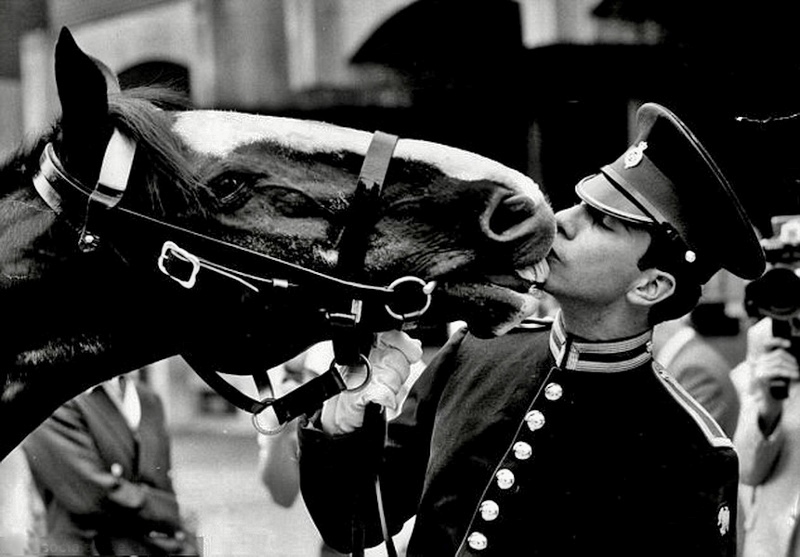 Sefton - a four year old Irish thoroughbred cross (named after Lord Sefton, a former Household cavalry officer) Sefton - a four year old Irish thoroughbred cross (named after Lord Sefton, a former Household cavalry officer)
joined the ranks of the army in 1967 and then transferred for ceremonial duties to
The Blues and Royals mounted squadron at Knightsbridge barracks.
On 20th July, 1982, Sefton was en-route to the Changing of the Guard ceremony together with 15 other
horses when a terrorist bomb was detonated very close to them. Four soldiers and seven horses were killed. Sefton’s injuries were very serious but with immediate, expert help from the regimental vet and prolonged aftercare,
he recovered.
During this recovery period he became a favourite of the nation, receiving huge quantities of cards, mints
and £650,000 in cash which paid for a new wing at the Royal Veterinary College and which is named after him.
He was retired in 1984 and as a result of incurable lameness (from his many wounds) he was put to sleep in 1994.
Now, here’s the point of this tale.
The hooves of celebrated cavalry horses are preserved after their demise and are then mounted in silver and
usually distributed to the regimental messes of the officers and non-commissioned ranks of the regiment.
At the last unofficial count, there were 17 other hooves held in private hands - all of them claimed to be originals!
Now, back to my military service.
It didn’t quite work out the way I’d hoped it would and it was eight long years before I left the regiment to
take up a place at The Royal Academy of Music, having received one year’s basic instruction on the clarinet
at Kneller Hall, The Royal Military School of Music.
However, during the later years of my military service, I made time to catch up on my rather truncated,
secondary education. (I had been expelled from school for the usual reason i.e. trying to run it your way!)
I took a correspondence course in general education and delved into the more esoteric subjects: Classics,
Philosophy, Latin etc. as well as the core subjects necessary for matriculation. I managed to get through
most of the St James Bible as well, becoming fascinated by the Book of Revelation and predictably
The Four Horsemen of the Apocalypse, what they represented and most importantly, their putative mission.
Later in life I was enabled further to increase my knowledge and literary interests quite considerably through my bar studies.
It’s not all arid, the law!
So, back to Tull and, after being met with a warm acceptance from all quarters for my not inconsiderable
work in bringing The Waters Edge to the stage, I set about writing some songs.
After all, I was in the best place to try them out and so I got on with it - subject material was plentiful to say the least.
The state of the UK economy at the time provided rich pickings for commentary, expressed in mine or
any one else’s lyrics. The miners strike, the three day weeks and the power cuts we’d endured earlier in
the decade led me, if not directly, then circumstantially to cast the shape of my mood.
Great Britain (and a large part of the world) was in a mess, and I would not have been at all surprised to
have heard on the news that The Four Horsemen had been seen charging down Piccadilly!
I was just waiting the opportunity to introduce them and used them in the first couplet of my song. Ho Ho....
In the reflective middle section of the lyric, I suggest that the daily news isn’t worth bothering with and
that the likelihood of a Messiah arriving to change our views is patently not going to happen.
(It’s close on forty years since the song was written and there’s still no sign of changes taking place any time soon!)
To those of you in pursuit of a pearl of historical interest, may I suggest you check out (on youtube)
the BBC Lively Arts Documentary of 1979 . You will find at 44.02 (just after the bit where I’ve been talking
to the camera about Ian Anderson) the very first airing of Urban Apocalypse in its embryonic state.
This video contains content from BBC Worldwide, who has blocked it in your country on copyright grounds... 
Martin, Ian, John G and myself are “riffing” on it in the food room, backstage at the gig in Portland, Oregon.
Afterwards, John G asked me what "atavistic" meant. (He’d heard me singing it.)
I gave him a hug and told him. Bless him. 
The last verse of the song embodying the line which gave rise to this blog is my earnest plea to the nations
- then AND now - to stop the fighting, the killing, the cheating and the rest of the selfish and greedy behaviour
which is dragging the world, and everyone on it, closer to the abyss into which -
in the absence of serious, corrective measures being administered and heeded - we surely will fall.
We hold the reins of The Apocalypse. Let us all make sure that they are placed in the safest of hands. Urban Apocalypse
(From the Book of Common sense...!)
Halt the ringing cry of progress
sang the horsemen riding by.
We’ve wasted all the good God gave us
and we’re riding back to yesterday.
Turn the tables in the temples
break the Holy Trinity of Life Assurance,
Hedge Fund Trading
and Corporate inefficiency.
Stop cheating for your daily dues.
The race is run: no prize - we lose.
Stop craving for the daily news;
there’s no Messiah to change your views.
The homeless, bread-less queues must eat;
let reason re-assume it’s seat.
We stand straining in the slips:
We hold the reins of the Apocalypse.
Galvanise yourselves to action;
cast aside iniquity.
Atavistic voices tell us
to write our names in history
Halt the ringing cry of progress
sang the horsemen riding by.
We’ve wasted all the good God gave us
and we’re riding back to yesterday.
To yesterday, yesterday
To yesterday,
Yesterday.
DP Shropshire 1st February 2018  LINK 2 LINK 2 
|
|
|
|
Post by steelmonkey on Feb 6, 2018 21:41:27 GMT
Got my Dee Cee Dee in today's mail. Looking forward to debut in car tomorrow...almost switched from bike to car today for sole purpose of hearing the new music but we are having a warm spell and I needed to ride. Review to follow....SOON. Very excited.
My copy IS SIGNED !
|
|
|
|
Post by JTull 007 on Feb 16, 2018 2:38:36 GMT
An evening of music and cabaret with Dee Palmer,
Paul and Penny, poet Meg Cox and more
Fundraiser for Knucklas Castle Community Land Project  LINK LINK  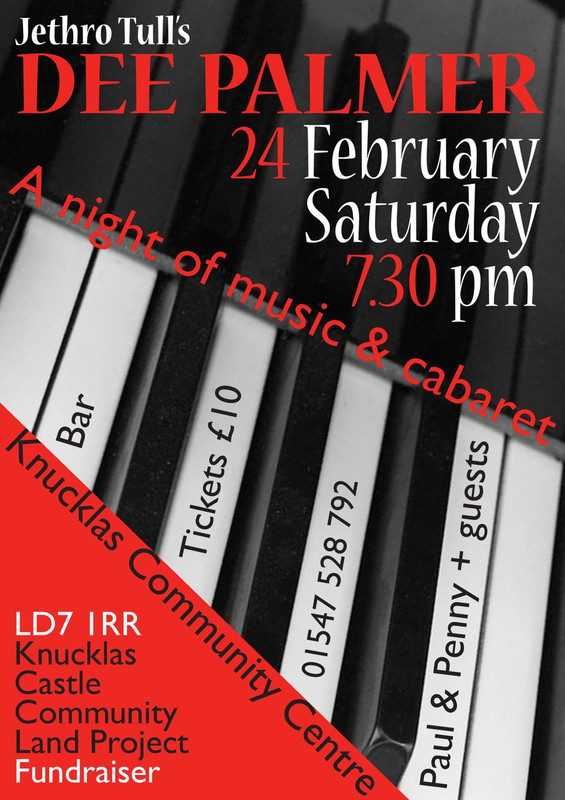
|
|
stevep
Master Craftsman
  
Posts: 431
|
Post by stevep on Mar 21, 2018 22:26:57 GMT
Wondered if anyone managed to get along to Dee's concert last month and if so, how was it?
I also wondered if anyone has managed to have a good listen to Dee's album too and what they thought of it too??
I think it is excellent. In parts it reminds me of the Heavy Horses Tull era and Dee is just so talented. The tracks with Martin Barre just show that Tull was certainly not a one man band back then.
(IA has said as much in many interviews in the past anyway).
I just wish that this album was made available to a wider audience.. it would be nice if the Prog Rock magazine could review it and even possibly the Tull page make a note of it.
It must has taken some effort to make the album and I dont think it is available on Itunes, Amazon, etc.
|
|
|
|
Post by nonrabbit on Mar 21, 2018 22:32:45 GMT
Wondered if anyone managed to get along to Dee's concert last month and if so, how was it? I also wondered if anyone has managed to have a good listen to Dee's album too and what they thought of it too?? I think it is excellent. In parts it reminds me of the Heavy Horses Tull era and Dee is just so talented. The tracks with Martin Barre just show that Tull was certainly not a one man band back then. (IA has said as much in many interviews in the past anyway). I just wish that this album was made available to a wider audience.. it would be nice if the Prog Rock magazine could review it and even possibly the Tull page make a note of it. It must has taken some effort to make the album and I dont think it is available on Itunes, Amazon, etc. That's a good idea. I haven't heard it yet. |
|
stevep
Master Craftsman
  
Posts: 431
|
Post by stevep on Mar 21, 2018 23:05:10 GMT
You can listen to parts of the album on www.missdeepalmer.com and there is a video of it being recorded, etc. The site is well put together and will be of interest to Tull fans from Dee's era.. One of the most Tull like parts (in my mind anyway) is in Urban Apocolypse and you can hear a clip of this here.. The clip is near the bottom of the page.. missdeepalmer.com/urban-apocalypse/ |
|
|
|
Post by steelmonkey on Mar 22, 2018 15:46:52 GMT
Very surprised that there is no link on Tull page...how could that be? This amazing album should be of huge interest to Tull fans...far more important and enjoyable than some of the 32 second Ian contribution clips that do get noted on Tull site! Maybe Dee idealistic about pushing album on it's own merits without Tull boost? It's so good...more people should hear it, for sure. I already gave mine away and plan to buy another one....or maybe a few for distribution to friends. Now I have to make friends....damn.
|
|
|
|
Post by JTull 007 on Apr 26, 2020 22:25:41 GMT
Hopefully this can be viewed in all places... 
Jethro Tull - BBC Lively Arts Documentary 1979 - Part 1 & 2 & 3
Videos by Scott Gordon DARK AGES 1979
|
|
|
|
Post by maddogfagin on Apr 27, 2020 6:22:16 GMT
Hopefully this can be viewed in all places... 
Jethro Tull - BBC Lively Arts Documentary 1979  |
|